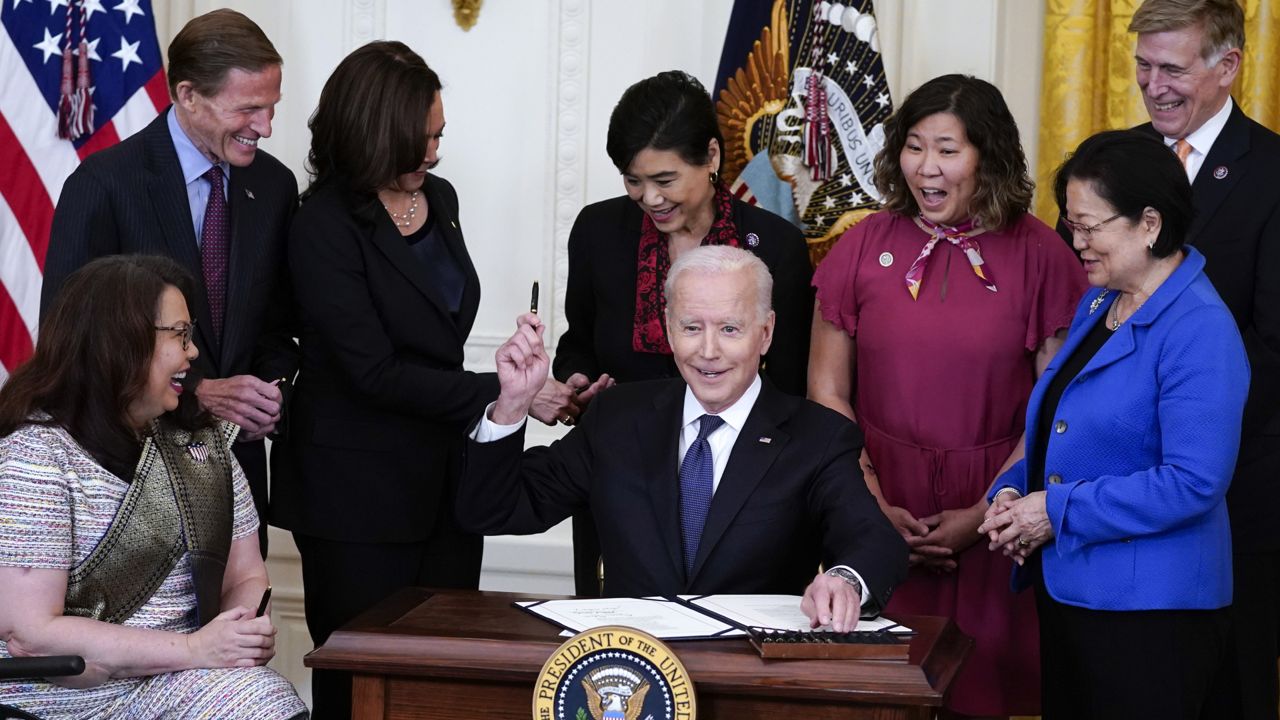President Joe Biden signed the COVID-19 Hate Crimes Act into law on Thursday, telling those assembled in the East Room of the White House that the law represents the “first significant break” in turning the tide of hatred against members of the Asian-American and Pacific Islander community.
“For centuries, Asian Americans, Native Hawaiians, Pacific Islanders, diverse and vibrant communities, have helped build this nation, only to be often stepped over, forgotten, or ignored,” Biden said.
“My message to all of those who are hurting is: We see you. Congress said we see you. And we are committed to stopping the hatred and the bias,” he later added.
The law is one of the first major efforts by the government to combat the striking rise of hate crimes against Asian Americans and Pacific Islanders.
The bill will expedite the review of hate crimes at the Justice Department and make grants available to help local law enforcement agencies improve their investigation, identification and reporting of incidents driven by bias, which often go underreported.
More than 3,000 violent incidents against Asian Americans and Pacific Islanders have been reported to Stop AAPI Hate, a California-based reporting center for such crimes, and its partner advocacy groups since mid-March 2020.
“I believe with every fiber of my being that there are simple, core values and beliefs that should bring us together as Americans,” Biden said Thursday. “One of them is standing together against hate. Against racism, an ugly poison that has long haunted and plagued our nation.”
Bipartisanship was a large focus of Biden’s address, and both he and Vice President Harris commended lawmakers on both sides of the aisle for working together to create the legislation.
“We got a lot more to do, but we simply haven't seen this kind of bipartisanship for much too long in Washington,” Biden said. “You’re showing that our democracy can work, and deliver for the american people.”
Both Biden and Harris called out several lawmakers in attendance by name, including Sens. Tammy Duckworth, D-Ill., Mazie Hirono, D-Hawaii, and Susan Collins, R-Maine, as well as Rep. Grace Meng, D-N.Y., for their leadership in particular.
“To the members of our United States Congress, on both sides of the aisle, who helped pass the COVID-19 Hate Crimes Act: Thank you,” Harris said. “Because of you, history will remember this day and this moment when our nation took action to combat hate.”
The bill passed both chambers of Congress on a widely bipartisan basis. The U.S. House of Representatives voted 364-62 in favor of the legislation earlier this week; it passed the Senate on a 94-1 vote, with Sen. Josh Hawley (R-MO) casting the sole opposition vote.
The final version of the bill was hard-fought, and Republicans agreed to back the compromise bill after the Senate also voted on and rejected a series of GOP amendments, including efforts to prevent discrimination against Asian Americans in college admissions and reporting about restrictions on religious exercise during the pandemic.
Sens. Hirono and Collins in particular worked to incorporate some additional Republican and bipartisan provisions.
Ultimately, the two agreed to fold in another proposed piece of legislation — the Jabara-Heyer NO HATE Act — as an amendment to the bill’s final text.
The No Hate Act was named after Heather Heyer and Khalid Jabara, whose families were also in attendance at Thursday’s ceremony.
Heyer, 32, was killed by an avowed white supremacist when he deliberately drove his car into a group of counterprotesters at a “Unite the Right” rally in Charlottesville in 2017. Jabara, a 37-year-old Lebanese man living in Tulsa, was murdered by his white neighbor in 2018, in what was ultimately ruled a hate crime.
The amendment bearing their name will, in part, give DOJ-allocated grants to authorized local law enforcement to aid in the creation of reporting hotlines for hate crimes, additional resources for communities with low English proficiency, and increased education surrounding hate crimes.
“Thank you for being here, it takes a lot of courage,” the president said to Heyer and Jabara’s respective relatives. “Because of you, the amendment named in honor of Khalid and Heather is now law.”



